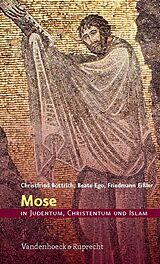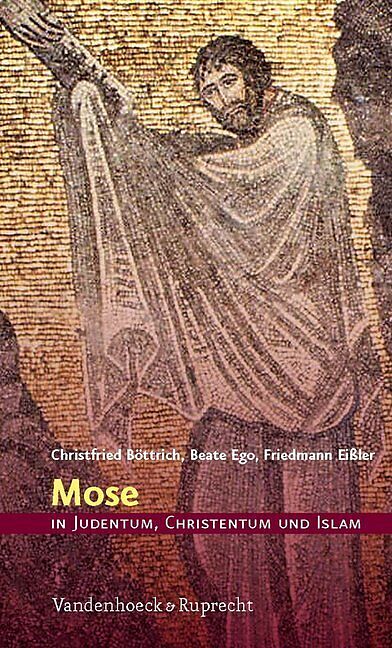Mose in Judentum, Christentum und Islam
Einband:
Fester Einband
EAN:
9783525630181
Untertitel:
Deutsch
Genre:
Religions-Lexika
Autor:
Christfried Böttrich, Beate Ego, Friedmann Eißler
Herausgeber:
Vandenhoeck + Ruprecht
Auflage:
1. Auflage
Anzahl Seiten:
181
Erscheinungsdatum:
01.09.2010
ISBN:
978-3-525-63018-1
Die Tora als Zentrum des religiösen Lebens - auch für Christen und Muslime?
Recht und Gesetz sind in allen Religionen fundamentale Größen. Dabei geht es nicht nur um die Pragmatik des Zusammenlebens, sondern vor allem um die Frage einer göttlichen Legitimierung des Rechtes. Dazu berufen sich alle Religionen auf bestimmte Ursprungserzählungen bzw. auf unhinterfragte Autoritäten. In den drei abrahamischen Religionen ist Mose dafür eine der wichtigsten Symbolfiguren. In seiner Geschichte fungiert zudem die Gabe einer Rechtsordnung dazu, die von Gott geschenkte Freiheit zu bewahren. Der Exodus aus Ägypten und die Offenbarung der Tora sind nicht nur erzählerisch, sondern auch sachlich eng miteinander verbunden. Die Gabe der Tora vom Sinai erscheint in der hebräischen Bibel als eine Schlüsselerzählung, die das Recht als Weisung Gottes einführt. Die Tora selbst wird zum Zentrum des religiösen Lebens; ihre Auslegung avanciert zur vornehmsten Aufgabe eines jeden Frommen. An Mose, der Gottes Weisung vermittelt, orientiert sich der Alltag. Was aber wird daran mit Jesus Christus anders? Ist der Lehrer aus Nazaret etwa ein neuer Mose? Warum finden sich bei dem Apostel Paulus so viele kritische Töne gegenüber der Tora? Worauf gründet sich christliche Ethik? Ähnliche Fragen richten sich auch an die muslimische Tradition. Wie ordnet der Koran den »Gesetzgeber« in seine Offenbarungsgeschichte ein? Wodurch werden die Rechtsetzungen des Propheten, die über die Sinaitora hinausführen, begründet? Welche Rolle spielt Mose in der volkstümlichen Überlieferung? Auf diese und andere Fragen versuchen Christfried Böttrich, Beate Ego und Friedmann Eißler eine Antwort zu geben. Ohne die Unterschiede und Spezifika zu verwischen, lassen die drei Autoren Mose und seine Geschichte als Teil eines gemeinsamen Erbes sichtbar werden.
Autorentext
Dr. theol. Christfried Böttrich ist Professor für Neues Testament an der Universität Greifswald.
Klappentext
Law and statutes are basic tenets of all religions. This is not only a matter of pragmatically regulating everyday life, but also a question of the divine legitimacy of law. All religions refer in this point to some original accounts or unquestioned authorities of long ago. In the three Abrahamic religions the central symbolic figure is Moses. His story also includes the origin of a legal system given by God to mankind to preserve. The exodus from Egypt and the manifestation of the Torah are connected to each other both in their narration and their inner meaning. The revelation of the Torah on Sinai is one of the key events in the Hebraic Bible as it introduces law to be a directive from God. The Torah becomes the center of all religious life, and its exegesis the highest duty of all pious people. Everyday life is built up around Moses, who received and passed on God will. But how did things change with the coming of Jesus Christ? Is the teacher from Nazareth the "new Moses"? Why is the Apostel Paul so critical of the Torah? What is the basis of Christian ethics? These and similar questions may be equally addressed to the Muslim tradition. How does the Koran depict the "lawgiver" in its own story of revelation? What is the basis for the law-making of the Prophet, which goes beyond the Torah of Sinai? What is the role of Moses in the popular tradition of Islam?Christfried Böttrich, Beate Ego and Friedmann Eißler present answers to these and other questions surrounding the tradition of law and ethics in the Abrahamic religions. While preserving the differences and specific qualities of the respective traditions, they also see Moses and his story as part of the common heritage.
Zusammenfassung
A look at the role of law and ethics.
Leseprobe

Leider konnten wir für diesen Artikel keine Preise ermitteln ...
billigbuch.ch sucht jetzt für Sie die besten Angebote ...
Die aktuellen Verkaufspreise von 6 Onlineshops werden in Realtime abgefragt.
Sie können das gewünschte Produkt anschliessend direkt beim Anbieter Ihrer Wahl bestellen.
Loading...
Die aktuellen Verkaufspreise von 6 Onlineshops werden in Realtime abgefragt.
Sie können das gewünschte Produkt anschliessend direkt beim Anbieter Ihrer Wahl bestellen.
| # | Onlineshop | Preis CHF | Versand CHF | Total CHF | ||
|---|---|---|---|---|---|---|
| 1 | Seller | 0.00 | 0.00 | 0.00 |
